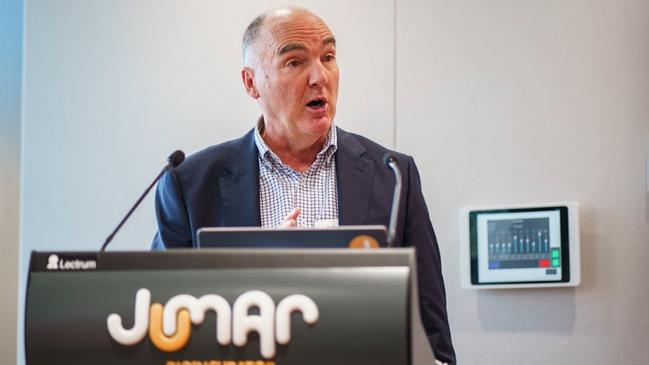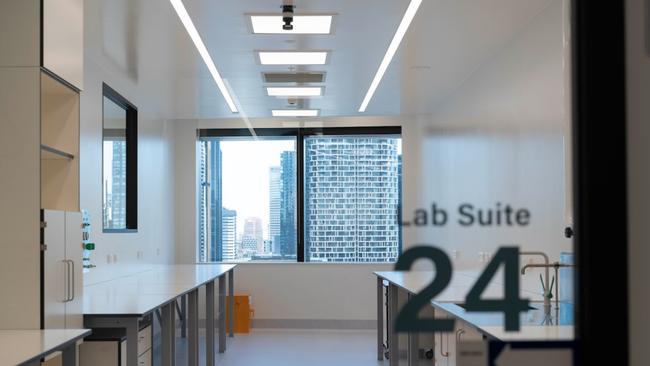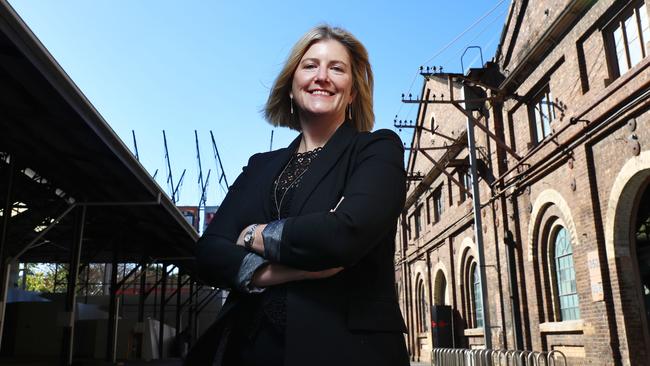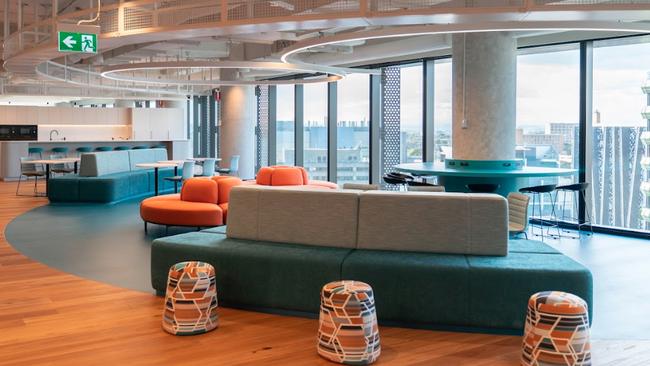Quest to unearth next CSL begins in Victoria thanks to state VC fund
Sixteen early stage ventures have taken residence in CSL’s Melbourne headquarters as part of a new biotech incubator that aims to build Australia’s next health juggernaut.

Business
Don't miss out on the headlines from Business. Followed categories will be added to My News.
Australia’s biggest biotech company, CSL, has voiced support for Victoria’s embattled $2bn state venture capital fund, saying without the scheme it wouldn’t have been able to host a start-up incubator program at its new Melbourne headquarters.
CSL has partnered with the University of Melbourne, Cicada Innovations and the Walter and Eliza Hall Institute to launch the Jumar Bioincubator, which this week welcomed 16 early stage ventures for its first cohort.
The project received a $25m injection from Breakthrough Victoria – the VC fund started by former premier Daniel Andrews and has been the target of criticism over the transparency of its investments.
But CSL chief scientific officer Andrew Nash said the Jumar Bioincubator - which is designed to ‘build Australia’s next CSL’ - would not have happened without the government funding.
“The incubator will be just a really important piece in terms of the development of the sector in Australia. It will make a huge contribution. And thinking about it wouldn’t have happened without the investment from Breakthrough Victoria,” Dr Nash said.
“Their investment, their initial grant of $25m, was absolutely critical to CSL committing the space and the partners coming together, bringing Cicada on board to make things happen. So that investment from them was absolutely crucial. So we’re very grateful and we think the future will demonstrate that was a really good investment from Breakthrough Victoria.”
CSL was originally a government-owned company founded as Commonwealth Serums Laboratories during WW1 before being floated on the ASX in the 1990s before briefly overtaking BHP’s as Australia’s biggest listed company in 2020.
It now has a market value of about $132bn, making it the third largest ASX company behind BHP ($229bn) and Commonwealth Bank ($189bn).

The Jumar Bioincubator start-ups are working on developing a range of technology from creating ‘mini brains” in test tubes to help find cures for neurodivergent diseases like dementia, hormone sensing to assist people wanting to conceive through IVF and other fertility treatments, to a vaccine for periodontal gum disease.
Dr Nash said investing in start-ups was a “risky prospect” and the incubator won’t “solve all their problems”.
“But ultimately you have to have an eye both on the risks and the opportunities for the future, and I guess what the incubator is there to do is to sort of smooth out that risk profile,” Dr Nash said.
“We know where the challenges are for these small start-up companies and the incubator is specifically targeted at addressing some of those challenges. It won’t solve all the problems for them. It won’t make their technology or their medicine as successful - it was never going to be - but it will give them every opportunity to be successful.”
Cicada Innovations chief executive officer Sally-Ann Williams, who has called on the federal government to provide incentives for big business to buy more products and services from local tech companies to stop the US “stealing our jobs”, says setting start-ups up for success was all about timing.

She said the incubator aimed to ensure that participants had access to mentorship and expertise from CSL and other partners at crucial stages during their development.
“It’s really about giving the right advice at the right time, because it’s great to hear from experts. But if it’s 12 months before you need it, you don’t take it in the same way as it is when it’s really at a pain point that you’re actually struggling with on that day,” Ms Williams said.
“One of the things that we found and this is not just based on our historical data, but actually global historical data about incubators is that they have a much higher five year success rate. So it’s an 85 per cent survival rate. And I think it’s about 40 per cent better trajectory versus companies that go it alone.
“It’s not a flippant statement to say being around like minded individuals actually being amongst your peers that are on the same journey does prove… I mean, it’s just like coaching in a sport right? If you’re around people that are trying to achieve the same sort of overarching outcome, you do actually get better by being around people that are doing the same thing.”
To this end, it could take years for the incubator to show signs of success - but that’s part of its design.
“In a decade to come… that’s when we need to be measuring impact. It’s not six months after something opens its doors. It’s, you know, five years, 10 years, 15 years from now,” Ms Williams said.
“I’m hoping that in the decades to come, what we’ll be able to say is that the next global companies, biotech companies were built and they were residents of Jumar. Wouldn’t that be a phenomenal thing?”

Walter and Eliza Hall Institute acting director Alan Cowman said: “By nurturing the next wave of biotech entrepreneurs, Jumar Bioincubator is helping to take the most exciting ideas out of research laboratories and into the world, for the benefit of our communities”.
“Jumar bridges a key gap in our biomedical ecosystem, with world-class research facilities and expert commercialisation support to empower our scientist-entrepreneurs,” Professor Cowman said.
“We need to accelerate the translation of innovative Australian discoveries into the new treatments, diagnostics and devices that can have the greatest impact on global human health – and Jumar is a vital step forward for this.”
Breakthrough Victoria chief executive Grant Dooley said the state had taken “another giant step” to becoming a globally recognised hub for biotechnology development and commercialisation.
“Breakthrough Victoria supports innovations that enable industries to create sovereign capability and jobs by mobilising intellectual property for the good of Victoria,” Mr Dooley said.
“We believe in the power of capital and its ability to positively impact people’s lives and the planet, which is why we invest in and support the ideas, businesses and products that can change lives for the better and generate a positive social and environment impact for all.”
Originally published as Quest to unearth next CSL begins in Victoria thanks to state VC fund



